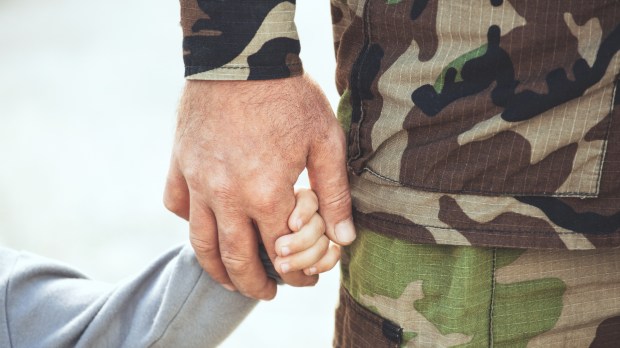It can be difficult talking with our children about serving in the military. Should we talk about the risks of the job? Should we downplay them to make daily life less stressful? How can we keep connected when a military parent is deployed?
While we can hardly hide the danger of the profession from our children, we can find age-appropriate ways of talking about it. Marie-Armelle, whose husband serves in a branch of the French armed forces, lives in barracks with their four children and has no intention of hiding from them the injuries or accidents that their father could suffer in the line of duty. However, while she doesn’t deny the risks of the job and naturally talks about them with her kids, she refrains from talking about fatal risks.
Elise and Florian, the latter of whom is in the armed forces, have chosen not to talk about the risks at all to their children, who are still young. Elise says,
“I don’t think we should explain it to them before they are pre-teens, or before they ask questions themselves. I prefer to focus my explanations on the fact that their dad is protecting the public and has all the training and tools to keep himself safe.”
Their definition of the job is still very simplistic at this point: “Daddy protects people from the bad guys.” It’s fundamental to highlight for young children the sense of commitment: “It helps emphasize the sense of duty and self-sacrifice.”
Children who see one of their parents bringing weapons home aren’t fooled for long, and anxieties can arise in the face of a profession that is fraught with danger. “My eldest often asks my husband if he has ever killed anyone,” explains Marie-Armelle. “It’s something that seems to make him anxious. My husband comes home with his gun, so they get regular reminders about the danger it poses.”
Daily adaptation
Periods of absence of a parent, even if foreseen and explainable, are still difficult to live with in a household. Children build their lives around rituals and stable reference points, so they can be destabilized by changes to family life, such as a constant alternation between presence and absence.
Marie-Armelle and Elise read their children stories that help them understand their father’s job. “Understanding what their father’s branch of the armed forces does keeps them from inventing stories and imagining things and becoming anxious,” says Elise.
A calendar on which the family can count the days between two deployments of the absent father or mother can be a concrete and reassuring tool. For younger children, the absence can be a bit demoralizing, says Marie, whose oldest child is 5 years old, as their notion of time is still quite relative. However, she has no shortage of ideas to help her children pass the time more easily:
“For the most recent deployment, I printed and laminated two photos for each child: one of their father in fatigues, the other of the child with their father. They slept with them every night. Also, every weekend during a deployment, we mark the occasion with a fun activity and a good dessert at the bakery. And above all, I tell them over and over again that Daddy is away on business, not because of them, and that he loves them very much. And he, on his part, records little videos where he explains to them in situ what his room is like, his corner of the tent, his office, the infirmary, the camp, etc. and the children ask for them over and over again!”
An ordinary daily life can be organized, with patience and tenderness, around a job with an unusual rhythm and high stakes.
Keeping worries low key
While it’s legitimate and normal for “the one who stays behind” to be worried, such concerns can be delicate to manage in front of the children, depending on their age and their sensitivity. Marie-Armelle remembers Christmas 2019:
“We lived through a deployment to a dangerous mission. I had a lot of trouble keeping my cool during a few very stressful days. I had very little news, and the little I had was not reassuring. My children were all under five, so I didn’t want to tell them, and I went home to visit my family earlier than expected.”
While it’s important to be clear and honest, it’s not necessarily wise to explain everything too quickly to children. How would it help them to be walking around full of anxiety about death on a daily basis, with each departure of their father or mother?
Admiration that provides consolation
If there’s one thing that unites military children, it’s the boundless admiration they have for their parents. Marie-Armelle says,
“My children are totally in awe of their father’s profession. The two eldest want to be gendarmes too. They’re passionate about the books that explain this profession, about the uniform and about the vehicles. It’s a world to which they’ve felt they belong since they were born, because we live in barracks.”
The “superhero dad” aspect also fascinates the children of Marie, the wife of a military doctor. This extraordinary aspect of his profession, being a dad who saves soldiers, helps the children by “making it a little easier to swallow the pill of his absences.”



